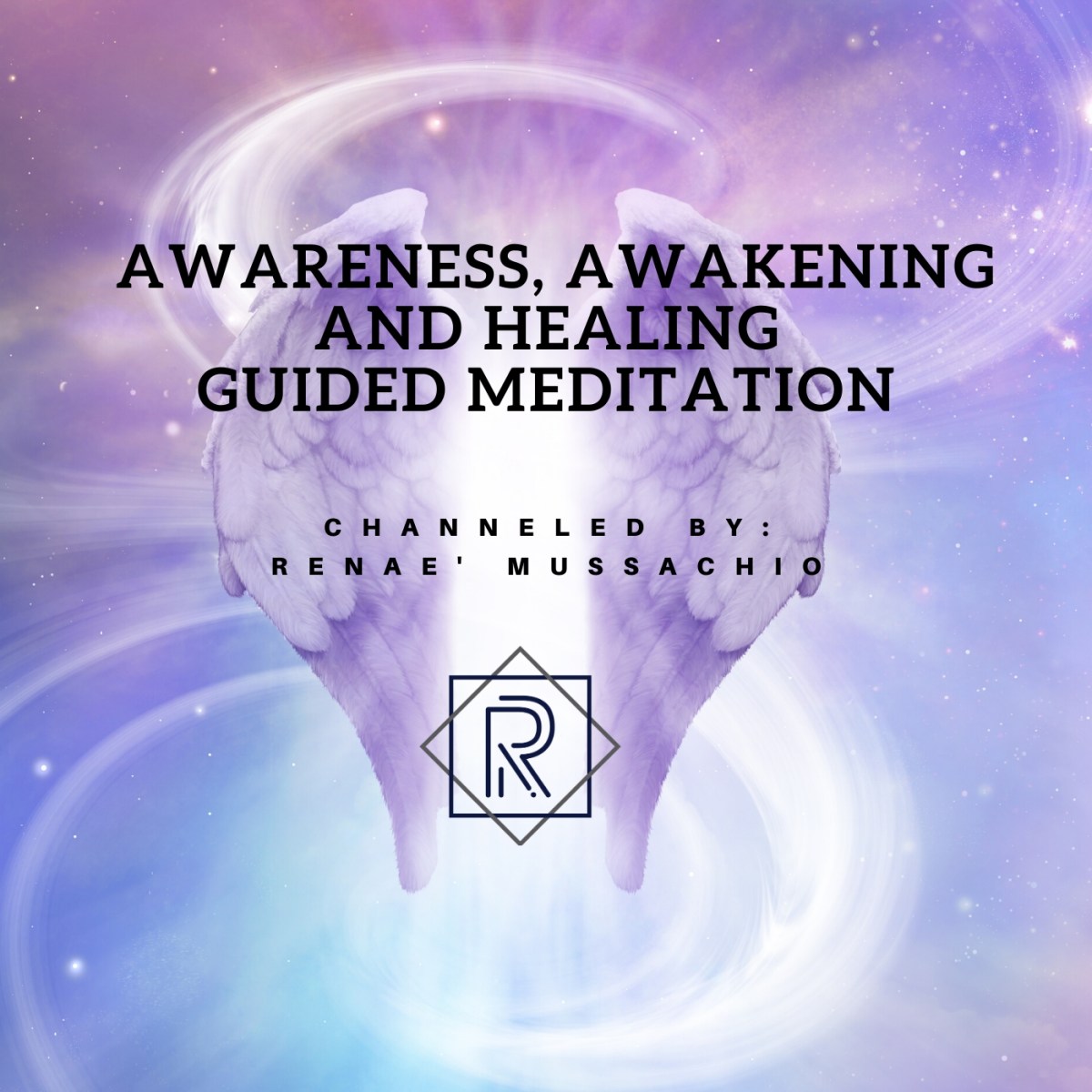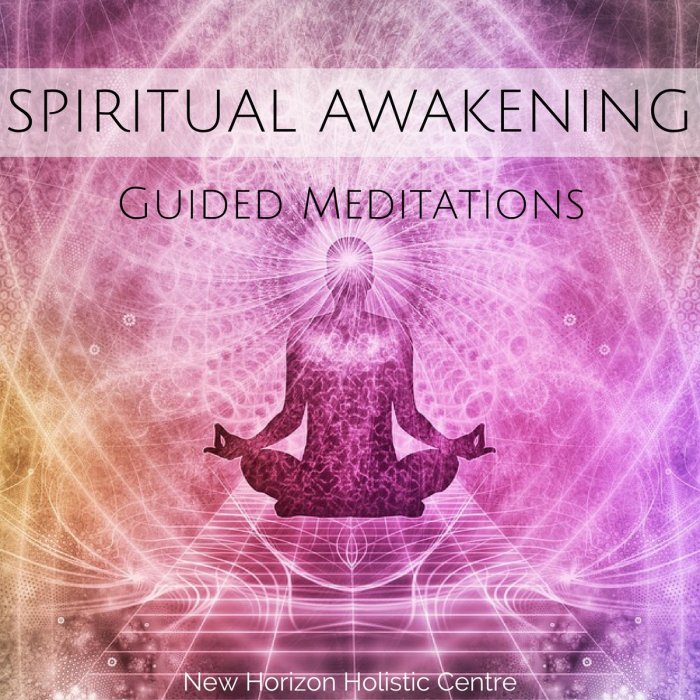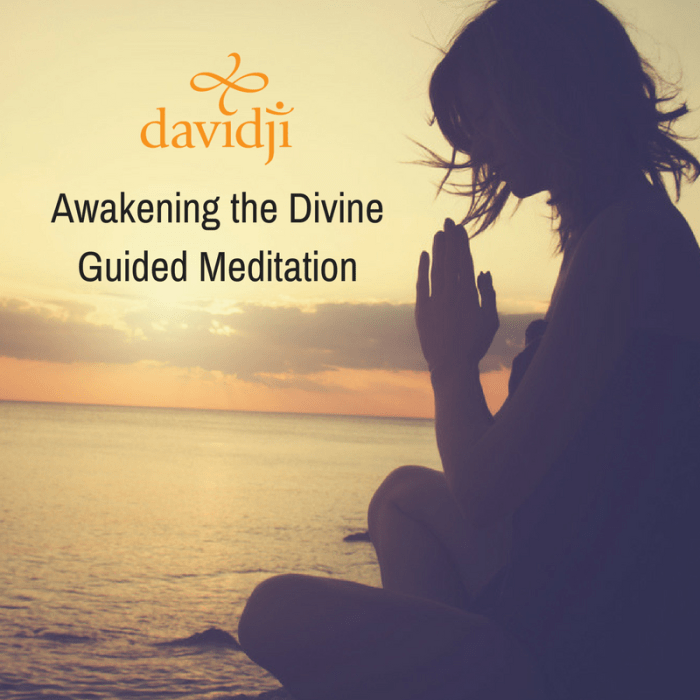Guided Meditations for Spiritual Awakening: A Journey of Self-Discovery

Guided meditations for spiritual awakening offer a profound path to inner peace, self-awareness, and a deeper connection to the universe. These practices, rooted in ancient wisdom, provide a structured framework for quieting the mind, exploring the depths of consciousness, and ultimately, achieving a state of enlightenment.
Through guided meditations, individuals can embark on a journey of self-discovery, transcending limitations and unlocking their full potential.
This exploration delves into the concept of spiritual awakening, outlining its various stages and potential benefits. We’ll examine the role of guided meditations in facilitating this transformative process, exploring different types of meditations, their techniques, and the specific benefits they offer.
We’ll also provide resources and practical guidance on incorporating guided meditations into daily life, emphasizing the importance of consistent practice and addressing potential challenges.
The Concept of Spiritual Awakening: Guided Meditations For Spiritual Awakening

Spiritual awakening is a profound and transformative process that involves a shift in consciousness, leading to a deeper understanding of oneself and one’s place in the universe. It is a journey of self-discovery, often marked by a profound sense of connection to something greater than oneself.
Stages of Spiritual Awakening
The journey of spiritual awakening is often described as a process that unfolds in stages. While the experience can vary greatly from person to person, these stages offer a general framework for understanding the transformative nature of this process.
- Awakening: The initial stage, characterized by a sudden realization or shift in perception. This awakening can be triggered by a variety of events, such as a personal crisis, a profound experience in nature, or a spiritual practice. Individuals may experience a sense of wonder, awe, or a deep connection to something greater than themselves.
- Exploration: This stage involves delving deeper into the newfound awareness. Individuals may seek out spiritual teachings, practices, or communities to further their understanding. They may begin to question their beliefs and values, exploring different perspectives and philosophies.
- Integration: The process of integrating the awakened state into daily life. This involves aligning thoughts, feelings, and actions with the newfound understanding. It can involve making significant changes in lifestyle, relationships, or career choices.
- Transcendence: The ultimate stage of spiritual awakening, characterized by a profound sense of unity and interconnectedness. Individuals experience a deep sense of peace, joy, and unconditional love. They may see the world through a lens of compassion and wisdom.
Benefits of Spiritual Awakening
Spiritual awakening can bring about numerous benefits, both personal and societal. These benefits can manifest in various aspects of life, leading to a more fulfilling and meaningful existence.
- Increased Self-Awareness: Spiritual awakening often leads to a deeper understanding of oneself, including one’s strengths, weaknesses, and motivations. This increased self-awareness can lead to greater self-acceptance and compassion.
- Enhanced Compassion: A spiritual awakening often cultivates a sense of empathy and compassion for others. Individuals may develop a deeper understanding of the interconnectedness of all beings, leading to more loving and supportive relationships.
- Greater Purpose and Meaning: Many individuals who experience spiritual awakening report finding a renewed sense of purpose and meaning in life. They may discover a calling or a mission that aligns with their values and beliefs.
- Improved Mental and Emotional Well-being: Spiritual awakening can contribute to improved mental and emotional well-being. The sense of peace, joy, and connection can reduce stress, anxiety, and depression.
Personal Experiences with Spiritual Awakening
Spiritual awakening is a deeply personal experience, and its manifestation can vary greatly from person to person. Some individuals may experience a dramatic and sudden awakening, while others may undergo a gradual and subtle shift in consciousness. There are countless examples of individuals who have shared their experiences of spiritual awakening, often describing transformative shifts in their perception of themselves and the world.
“I remember the day I realized that I was not my thoughts or my emotions. It was like a veil had been lifted, and I saw myself for the first time. I felt a profound sense of peace and freedom.”
Anonymous
Many individuals who have experienced spiritual awakening find solace and support in sharing their stories with others. These shared experiences can inspire and guide others on their journeys of self-discovery and spiritual growth.
Guided Meditations for Spiritual Awakening
Guided meditations are powerful tools for fostering spiritual awakening by promoting self-awareness, inner peace, and a deeper connection with the divine. These meditations provide a structured framework for exploring the inner landscape, allowing individuals to access profound insights and transformative experiences.
Types of Guided Meditations
Guided meditations can be categorized into different types, each employing unique techniques to facilitate specific spiritual experiences.
- Mindfulness Meditation: Mindfulness meditation focuses on cultivating present-moment awareness without judgment. It involves paying attention to thoughts, feelings, and sensations as they arise, and observing them without getting caught up in them. Techniques include focusing on the breath, body scan, and mindful walking.
- Visualization Meditation: Visualization meditation involves creating vivid mental images to cultivate desired states of being or to access spiritual realms. It can be used to visualize positive affirmations, healing experiences, or encounters with spiritual beings.
- Mantra Repetition Meditation: Mantra repetition meditation involves repeating a sacred sound or phrase, such as “Om” or “Aum,” to quiet the mind and connect with the divine. This practice can induce deep relaxation, enhance concentration, and promote a sense of inner peace.
Techniques Used in Guided Meditations
Guided meditations typically employ a variety of techniques to facilitate the desired state of awareness and spiritual exploration. These techniques include:
- Guided Imagery: This technique involves using vivid descriptions and metaphors to create mental images that evoke specific emotions or experiences. The guide may describe a peaceful forest, a serene beach, or a radiant light, inviting the participants to immerse themselves in the imagery.
- Breathwork: Breathwork techniques are integral to guided meditations, as they help regulate the nervous system and promote relaxation. The guide may lead the participant through specific breathing exercises, such as deep belly breathing or alternate nostril breathing.
- Affirmations: Affirmations are positive statements repeated to reprogram the subconscious mind and cultivate desired beliefs and behaviors. The guide may offer affirmations related to self-love, gratitude, or spiritual connection.
- Progressive Relaxation: This technique involves systematically tensing and releasing different muscle groups in the body, promoting deep relaxation and reducing physical tension. The guide may lead the participant through a progressive relaxation sequence, starting with the toes and moving up to the head.
- Sound Healing: Sound healing involves using specific frequencies and vibrations to promote relaxation, balance, and spiritual transformation. The guide may incorporate sound bowls, chimes, or other instruments to create a calming and resonant atmosphere.
Benefits of Guided Meditations for Spiritual Awakening

Guided meditations offer a structured and supportive approach to spiritual growth, providing numerous benefits that can accelerate your journey toward self-discovery and enlightenment. By harnessing the power of focused attention and intention, guided meditations can lead to profound shifts in consciousness, fostering a deeper connection with your inner self and the universe.
Enhanced Self-Awareness
Guided meditations can be a powerful tool for enhancing self-awareness. Through the process of focusing your attention inward, you become more attuned to your thoughts, emotions, and physical sensations. This heightened awareness allows you to observe your internal landscape without judgment, fostering a greater understanding of your patterns and motivations.
“Meditation is the practice of paying attention to the present moment without judgment.”
Jon Kabat-Zinn
Improved Emotional Regulation, Guided meditations for spiritual awakening
Guided meditations can help you develop greater emotional regulation by teaching you to observe your emotions without getting swept away by them. By cultivating a mindful approach to your emotional experiences, you can learn to manage stress, reduce anxiety, and cultivate a sense of inner peace.
Increased Compassion and Empathy
Guided meditations often involve cultivating feelings of compassion and empathy for yourself and others. By focusing on the interconnectedness of all beings, you can develop a deeper sense of understanding and acceptance, fostering more harmonious relationships with yourself and the world around you.
Reduced Stress and Anxiety
Numerous studies have shown the effectiveness of meditation in reducing stress and anxiety. Guided meditations, in particular, can provide a structured and calming experience, allowing you to access a state of relaxation and tranquility.
“Meditation is not about emptying your mind, it is about becoming aware of what is happening in your mind.”
Eckhart Tolle
Improved Focus and Concentration
Guided meditations can train your mind to focus and concentrate, improving your ability to pay attention and stay present in the moment. This enhanced focus can benefit all areas of your life, from work and relationships to your overall well-being.
Spiritual Growth and Connection
Guided meditations can facilitate spiritual growth by providing a safe and supportive space for exploring your inner world and connecting with a higher power. By engaging in regular practice, you can cultivate a deeper sense of purpose, meaning, and connection to something greater than yourself.
Finding and Using Guided Meditations

Guided meditations can be a powerful tool for spiritual awakening, offering a structured path to inner peace, self-awareness, and connection with the divine. The abundance of resources available makes it easier than ever to find and incorporate guided meditations into your daily routine.
Resources for Finding Guided Meditations
A wide range of resources are available to help you find guided meditations that align with your needs and preferences. These include:
- Meditation Apps: Numerous apps like Headspace, Calm, Insight Timer, and Medito offer a vast library of guided meditations on various topics, including spiritual awakening. They provide curated playlists, personalized recommendations, and progress-tracking features.
- Websites: Websites like YouTube, SoundCloud, and Dharma.org offer free and paid guided meditations from diverse teachers and traditions. You can explore different styles and themes to find what resonates with you.
- Books: Books dedicated to guided meditations often include scripts or audio recordings to follow along. They can provide deeper insights into the principles and techniques of meditation, helping you understand the process better.
Incorporating Guided Meditations into a Daily Routine
Integrating guided meditations into your daily routine can be a transformative experience. Here’s a step-by-step guide:
- Choose a Time and Place: Select a quiet and comfortable space where you can relax without distractions. Consider the time of day when you’re most likely to be focused and undisturbed.
- Start Small: Begin with short meditations, even just 5-10 minutes, and gradually increase the duration as you become more comfortable. Consistency is key, so aim for daily practice.
- Experiment with Different Styles: Explore various guided meditations to find what resonates with you. Some meditations focus on breathwork, others on visualization, and some on mindfulness.
- Be Patient and Kind to Yourself: Meditation is a journey, not a destination. Don’t get discouraged if your mind wanders. Simply acknowledge the thoughts and gently redirect your attention back to your breath or the meditation object.
- Record Your Experiences: Keeping a journal can help you track your progress, identify patterns, and gain insights from your meditation practice.
Key Elements to Consider When Choosing Guided Meditations
When selecting guided meditations, consider the following elements to ensure they align with your goals and preferences:
| Element | Description |
|---|---|
| Topic | Choose meditations that address your specific needs and interests, such as stress reduction, self-compassion, or spiritual growth. |
| Length | Select meditations that fit your available time. Start with shorter sessions and gradually increase the duration as you progress. |
| Teacher’s Voice | Find a teacher whose voice is calming, as this can enhance the meditative experience. |
| Style | Explore different styles of guided meditations, such as mindfulness, visualization, or mantra-based practices, to find what resonates with you. |
| Music and Sounds | Consider the background music and sounds, as they can influence the overall experience. Choose a soundtrack that is calming and supportive. |
The Importance of Consistency and Practice

Spiritual awakening is not a one-time event; it’s a journey of continuous growth and transformation. Consistent practice is the key to unlocking the profound benefits of guided meditation and accelerating your spiritual progress.
Maintaining Motivation and Commitment
Maintaining motivation and commitment to guided meditation is essential for experiencing its transformative power. Here are some tips to help you stay on track:
- Set Realistic Goals: Begin with short meditation sessions and gradually increase the duration as you become more comfortable. Starting with 5-10 minutes daily is a good place to begin.
- Find a Quiet and Comfortable Space: Create a dedicated space where you can relax and focus without distractions. Ensure the environment is conducive to calmness and introspection.
- Track Your Progress: Keep a journal or use a meditation app to track your sessions and note any insights or changes you experience. This can provide motivation and help you identify areas for improvement.
- Join a Meditation Group: Connecting with others who share your interest in meditation can provide support, accountability, and a sense of community.
- Celebrate Your Successes: Acknowledge your commitment and celebrate your progress, no matter how small. This reinforces your positive actions and encourages continued practice.
Challenges of Integrating Guided Meditation into Daily Life
Integrating guided meditation into your daily routine can present challenges, but with persistence and a positive attitude, you can overcome them. Here are some common obstacles and strategies to address them:
- Time Constraints: Finding time for meditation can be difficult, especially with busy schedules. Prioritize meditation by scheduling it into your day, even if it’s for just a few minutes. Consider waking up a little earlier or utilizing short breaks throughout the day.
- Mind Wandering: It’s natural for your mind to wander during meditation. Don’t get discouraged; gently guide your attention back to your breath or the meditation object. Practice patience and compassion with yourself.
- Lack of Concentration: Concentration can be challenging, especially for beginners. Focus on the present moment, observing your thoughts and feelings without judgment. Practice mindfulness techniques to cultivate a more focused mind.
- Discomfort or Physical Sensations: You may experience physical discomfort or sensations during meditation. Acknowledge these sensations without resistance. Focus on your breath and let go of any tension or discomfort.
End of Discussion

Guided meditations for spiritual awakening provide a powerful tool for personal growth and transformation. By engaging in these practices, we cultivate a deeper understanding of ourselves and the world around us. The journey of spiritual awakening is a personal one, and the benefits of guided meditations can vary depending on individual needs and intentions.
However, with consistent practice and an open mind, we can unlock a profound sense of peace, clarity, and purpose, ultimately leading to a more fulfilling and meaningful life.
Comments are closed.